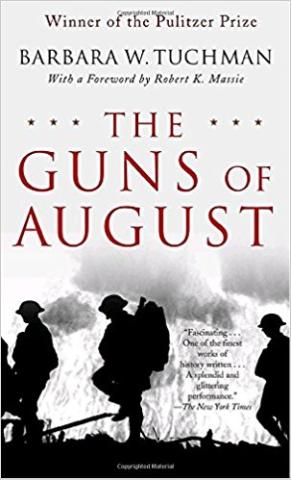- History
Barbara Tuchman’s Pulitzer Prize-winning The Guns of August is the starting point for any serious study of the First World War. Its great strength lies in its adroit connection of the political decision making and strategic miscalculations which led to the military operations that directly followed in that critical opening month of the war. Tuchman says it best at book’s end: “…the failures of the first month determined the future course of the war… and the conditions of the Second Round [WWII].” The events of August 1914, on and off the battlefield, doomed the Kaiser’s prediction that his soldiers would be home “before the leaves fell.”
Tuchman’s style is succinct enough that the book approaches “primer” status, using the term in a wholly positive vein. The author’s prose is such that you could be reading a newspaper account. No surprise, as she was not a classically trained historian. Nor does she have a military background, yet her description and analysis of the first month’s fighting shows an appreciation for the operational art that is extraordinary.
Of the many things that set the book apart are its descriptions of the various war plans. Germany’s vaunted Schlieffen Plan was anything but a well-kept secret; yet France’s Plan XVII ignored it in favor of an offensive cult of cold steel conducted by red-trousered infantrymen in an entirely different sector… with predictable results. Both plans failed; meanwhile Britain muddled and Russia mobilized.
With a journalist’s style, Tuchman insightfully depicts military stalwarts alongside men losing their nerve. Sadly, some of the latter would figure prominently in the carnage to come. Treatment of King Albert and Belgium’s role in providing not only the war’s spark, but ultimately criticality delaying the German offensive, is superb. Surprisingly, coverage of Germany’s “blank check” to Austria in the wake of Archduke Ferdinand’s Sarajevo assassination is superficial. Certainly, Serbia and Pan-Slavism were key factors in the domino fall of alliances and concomitant mobilization anxieties that ultimately resulted in four years of carnage nobody seemed to want, but nobody seemed able to prevent.
As the author graphically points out and our current Secretary of Defense has recently stated, there is always room for diplomacy. Barbara Tuchman understood this better than most. In 1984 she published The March of Folly, an abject underscoring of the adage that the lesson of history is that nobody learns the lesson.
















